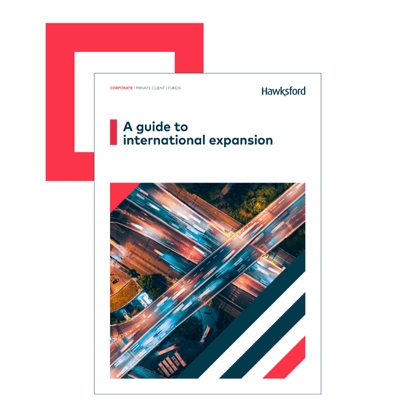According to the latest data from the Federal Competitiveness and Statistics Centre (FCSC), the UAE recorded a real gross domestic product (GDP) of AED1,776 billion in 2024. Up by 4% compared to the previous year, this is a strong indicator of the UAE as a place for business.
Yet, the Gulf’s investment landscape is becoming fiercely competitive. Neighbouring countries such as Saudi Arabia and Qatar are undertaking major economic reforms, striving to draw in more foreign investment.
This gives businesses more to consider when choosing locations that would be of interest now and in the future. Tommaso Barindelli, Head of Business Development in our Dubai office, lends his perspective on the opportunities that the UAE offers and how it is a stable base for the long term.
About Tommaso Barindelli
With nearly a decade of experience in the corporate services sector, Tommaso brings deep expertise in guiding small and medium enterprises (SMEs) and multinational companies through their expansion in the Middle East.
Having spent time living and working in the UAE and Southeast Asia, including leading delivery teams in Singapore, Tommaso adds a regional perspective to different client needs. He now oversees all business development initiatives for Hawksford in the UAE.
1. How would you describe the general mood and level of confidence among businesses operating in the UAE today?
I would start by saying that the general business sentiment is one of optimism in the UAE, despite the global macroeconomic uncertainties that are currently ongoing.
And the reason why there is confidence in the UAE from a business perspective, it's because the UAE offers political stability, modern infrastructure and business-friendly regulations. All of this has allowed the UAE to retain a strong reputation, despite the supply chain being disrupted by recent developments.
Companies that are now entering or expanding into the UAE are doing it in a more structured way. This can mean digital transformation, relocation of regional headquarters or industrial investments.
The free zone and mainland authorities have also stepped up their support, which has really increased the perception of the UAE as a stable industrial and corporate hub. And this has continued to attract foreign direct investments.
2. There’ve been several new developments such as the upcoming KEZAD Business District in Abu Dhabi. Could you share more?
The Khalifa Economic Zones Abu Dhabi (KEZAD) recently become one of the most transformative industrial and commercial developments in the region, so the KEZAD Business District is an extension of this vision.
The goal is to achieve an ecosystem that supports corporate, SMEs and investors in sectors that are advanced manufacturing, green energy and logistics. The benefit of KEZAD, most importantly, is in its integrations.
KEZAD is adjacent to the Khalifa port, which is one of the most advanced deepwater ports in the region. It's connected to the Etihad rail, to the UAE highway network.
This is specifically relevant because it reduces time to market and costs. Companies that are involved in distribution, production or regional trade can benefit from KEZAD as a location and what it offers: flexible lease models for the rental of warehousing and manufacturing plants, specific incentive programmes for investors and 100% foreign ownership.
Overall, KEZAD is aligned with the Abu Dhabi vision, which is positioning the emirate as high tech and sustainable. Several international groups, both from Asia and Europe/US, are looking at relocating their manufacturing plant and their production sites from jurisdictions such as China and India to the UAE, specifically to KEZAD.
3. Would you say this is part of the strive for economic diversification? Since moving beyond oil has been a key goal for the UAE’s leadership.
Definitely. Today, more than 75% of the gross domestic product (GDP) in the UAE comes from non-oil sectors. So, it is a case study for successful diversification of its economy in the region.
There have been strategic investments in advanced manufacturing, logistics, finance, artificial intelligence (AI) and tourism as well. And there are initiatives launched by the government such as Operation 300bn, the UAE National Tourism Strategy 2031 and the UAE Energy Strategy 2050.
All of these have created momentum and they're helping to not just diversify the GDP revenue but also reshape the economy completely. It allows businesses to have confidence in the environment and to have a long-term vision so they can plan for investments into the UAE.
Another aspect that is also part of the diversification is how the UAE is attracting talent. Dubai and Abu Dhabi are constantly ranked top of the charts as destinations for expats and business executives.
4. Other countries are also diversifying their economy. What makes the UAE stand out then?
There are competitors globally and in the region for the UAE. What sets the UAE apart is how the legal framework is versus in other hubs.
The UAE has a sound legal framework, and it offers a common law system in the DIFC and ADGM free zones that is internationally respected. This gives some legal predictability, which is important when multinationals and financial institutions are investing in a jurisdiction.
Another aspect which is connected to this one is how open the economy is. In the UAE, most of the sectors allow 100% foreign ownership and many of the free zone and mainland authorities have customised incentives that are sector specific.
The last one is infrastructure. There are eight international airports in the UAE, two major deepwater ports and a developing regional railway system. An interesting statistic is that 66% of the global population is within an eight-hour flight from Dubai or Abu Dhabi. So, for businesses that are in distribution, logistics or at the centre of trade flows, this is key and is an edge that few other international hubs can match.
5. We do see Dubai and Abu Dhabi often getting the spotlight within the UAE. How about the other emirates?
Dubai and Abu Dhabi are definitely the main destinations for foreign investment. But the other emirates are also playing an interesting role because they're complementary in the UAE economic model.
Sharjah, for example, has carved out a position as a cultural centre. They have developed specific initiatives to attract businesses in the publishing and the creative industries.
Ras Al Khaimah is an interesting case because it's grown consistently over the last few years and is becoming a preferred destination for investment in tourism, hospitality and real estate. This is linked to the Wynn Resorts and Casino project, which is the first of its kind in the UAE.
It's said to be completed in 2027 and there's going to be a lot of opportunities of investment for companies in the hospitality sector, food and beverage (F&B) and event management.
In addition to this, Sharjah and Ras Al Khaimah have lower costs to access and set up an entity, and they're near Dubai. So, you have that proximity without the kind of overheads seen in Dubai. For family businesses and small businesses, this is a good destination that they can consider.
6. As a whole, are there any emerging trends or industries that will become especially important in the UAE’s economy?
The trends that we see, there’s advanced manufacturing driven by Operation 300 billion. Free zones such as KEZAD, which we mentioned, Jebel Ali free zone and Dubai South are all main hubs for advanced manufacturing.
Another one would be climate tech and green energy, and this is because the UAE has a Net Zero 2050 target. It had hosted the COP28 event in 2023.
This is creating momentum and there are investments that have been accelerating into solar, hydrogen and carbon capture. It's a sector that will become increasingly relevant and the last one is AI and data centre. The UAE has invested heavily to become a hub for the development and the deployment of AI.
7. Finally, what are some of the common difficulties you’ve seen foreign businesses face while establishing in the UAE?
This is a good question. The UAE is business-friendly but it's not business simplicity. This means that the legal framework and regulations can be quite complex. Because it combines different points of entry such as the more than 40 free zones, different mainland authorities and offshore options, and it involves specific regulations in the different emirates. It's easy to set up a business in the UAE but there may be some complexities to consider.
From choosing a structure that’s the right long-term option from day one to having one that aligns with the business’ operational model, tax position and growth ambitions across the wider region, achieving a good setup is not as easy as it sounds.
Another friction point is bank account opening if not planned well. Opening a corporate bank account can take a few weeks in the UAE and there are also stricter KYC checks that have been implemented by the banks recently.
The last thing is, there is still a learning curve around the registration and filing of value added tax (VAT) and corporate income tax. The corporate income tax was introduced into the UAE about two years ago. So, it's important for companies to understand the filings and implications for their structures in the UAE. Because most investors are not familiar with corporate income tax in the UAE.
For new companies, it is important to assess, make the right choices and be compliant from the beginning. Otherwise, there will be penalties.
Leveraging the right partners who understand the nuances of internationalisation and market entry can help mitigate the risk of non-compliance. And from what we have seen from our clients, this has not drawn them away from the UAE.
The introduction of the corporate income tax actually made the UAE more reputable as a jurisdiction. It's comparable to jurisdictions such as Singapore, Hong Kong or other hubs that have corporate income tax.
The Hawksford Expert Q&A series features commentary on market developments and industry trends that matter to our clients. Our subject matter experts across Hawksford share their views to help businesses navigate change and make informed decisions. Subscribe to our newsletter to get the latest insights. All information presented in this article is accurate at the time of publication.

Speak to our experts today
Get in touch to find out how our Corporate team can support you with your business needs.
Updated on








